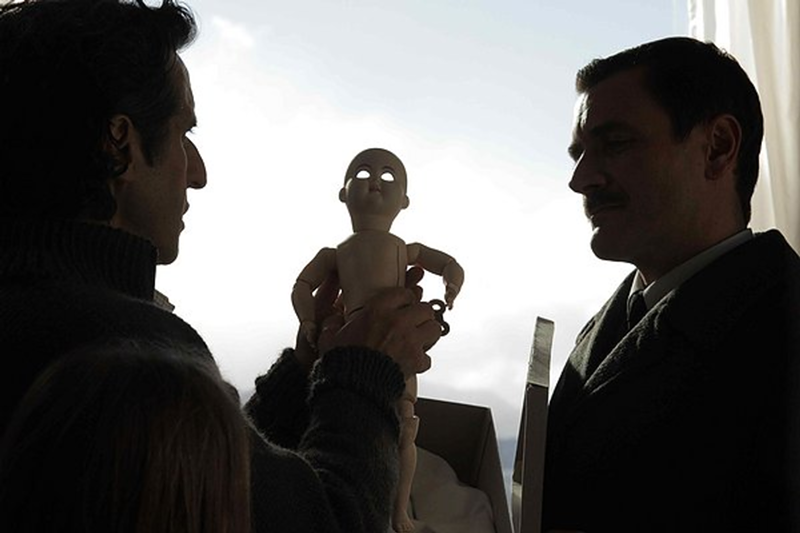It is only through an understanding of the undeniable facts of history that we can even begin to consider the evil that was Josef Mengele, the Nazi doctor who conducted the most horrific experiments on Jewish subjects during the Holocaust and then was able to elude the ensuing global manhunt for him that lasted decades. But writer-director Lucía Puenzo, in approaching one of the known episodes of his long-term flight from justice, offers a glimpse into the subtle charm (with more than a touch of real menace) of the man, which allowed him to roam the civilized world so freely.
The German Doctor finds Mengele (Àlex Brendemühl) crossing paths with an Argentinian family, and slipping through their defenses by focusing his attention on their young daughter Lilith (Florencia Bado), who develops a crush on the doctor. The family, headed by the suspicious Enzo (Diego Peretti) and his beautiful and quite pregnant wife Eva (Natalia Oreiro), is on its way to takeover the small hotel where Eva was raised.
Mengele, too, is headed to the same location and joins the family’s caravan. He immediately insinuates himself into Lilith’s good graces, speaking to her in conspiratorial fashion, treating her more as an adult than a child, which entices her rebellious nature. His interest in animal genetics piques her curiosity and leads her to ask the doctor for advice about her own physical development, since she, as a premature birth, has failed to grow and mature like her peers. Mengele gently tests, probes and measures her, offering assurances, especially to Lilith’s mother, who is worried about her current pregnancy. (And it turns out that Eva is to birth twins, which certainly intrigues Mengele and his nefarious interests in human genetics.)
All at once, Mengele uses each family member’s concerns to his advantage. Even Enzo, the most distrustful from the start, gets drawn in by Mengele, who invests in Enzo’s handcrafted doll-making enterprise, shifting the exquisite individuality and precise detail of Enzo’s efforts toward a more uniform production line approach incorporating what could have been a degree of heavy-handedness in this display of the Nazi’s master race mentality. Instead, it comes across as an example of chess-like manipulation of human nature in pursuit of an overall goal.
The seductive nature of evil is all the more powerful thanks to Bredemühl’s performance, which casts a strong dark shadow that never simply devolves into mere moustache twirling. His Mengele is all cold calculation, despite the fact that he could be mistaken for having a degree of human care and concern in him. Is he, in fact, truly infatuated with Lilith, or even Eva, for that matter? Enzo reacts out of what could be understood as jealousy for the attention Mengele shows to his wife and daughter, but again, history tells us that Mengele is all business.
This puts a certain perspective on the ability of the Third Reich to sweep a nation and much of Europe up in its fevered march toward domination and genocide. Popular culture representations hint at our curious fascination with such dark figures, but what emerges from those characterizations is a desire to remove any trace of human sensitivity or connection. Evil is best and most recognizable if there’s no way for us to miss its absence of heart and/or soul.
But could that kind of portrayal do justice to men like Mengele and Adolf Eichmann (Nazi officer and a major organizer of the Holocaust), who actively participated in such inhuman practices and escaped capture for so long, walking among us? We long to believe their lives were hellacious, in some way, as they were forced to constantly look over their shoulders while putting on a show or a mask of humanity.
The German Doctor presents a dry, yet far more likely scenario that highlights the indelible stain on all of us. Mengele is all too human, truth be told, eagerly pursuing his aims with an expansive network of support at the ready. He was not some lone predator outside the scope of civilized society, just as the Nazis weren’t a philosophical fringe group in Europe, ripping clumps of hair from their heads while foaming at the mouth; that kind of crazy we could have seen and avoided.
Think of all the evil geniuses we’ve encountered onscreen over the last 20 years. The Hannibal Lectors of film and television. The diabolical Jigsaw from the Saw franchise. Col. Hans Landa (Christoph Waltz) from Inglourious Basterds. What have they taught us? Evil ain’t crazy. Just watch (and watch out for) The German Doctor. (Opens Friday at Esquire Theatre) (R) Grade: A-


